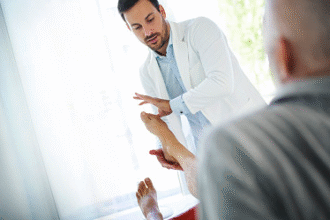Fever: What It Means and What To Do
A fever is a temporary rise in body temperature as the immune system responds to infection or inflammation. Fever itself is usually not dangerous and can help fight infection, but comfort measures and knowing when to seek care are important.
What Is “Normal” and How To Measure
- Typical oral temperature: about 37.0°C (98.6°F), but normal varies by person and time of day.
- Common measurement differences (approximate):
- Rectal: ~0.5°C (1.0°F) higher than oral
- Axillary (armpit): ~0.5°C (1.0°F) lower than oral
- Tympanic/temporal: can be close to core temp if used correctly; technique matters
- Use a digital thermometer. Avoid mercury thermometers.
- For infants, rectal temperature is most accurate; follow device instructions.
Fever is generally defined as:
– ≥38.0°C (100.4°F) rectal/tympanic/oral (method‑specific thresholds vary slightly)
Common Causes
- Viral infections (colds, influenza, COVID‑19), common in children and adults
- Bacterial infections (ear, throat, urinary, skin, pneumonia)
- Post‑vaccination responses
- Inflammatory/autoimmune conditions or heat illness (not an infection)
Symptoms and What They Mean
- Chills/shivering during temperature rise; sweating as fever falls
- Headache, muscle aches, fatigue, irritability (children may be fussy or lethargic)
- Dehydration risk from sweating, fast breathing, poor intake
Treat the person, not just the number: focus on comfort, hydration, and monitoring.
Home Care: Adults and Children
- Rest; wear light clothing; keep room comfortably cool; use a light blanket if chilled.
- Hydration: frequent fluids (water, oral rehydration solution, soups). Offer breast milk/formula to infants.
- Lukewarm sponging or a lukewarm bath can help comfort; avoid cold/ice baths or alcohol rubs.
- Nutrition: small, easy meals if hungry; it’s okay to eat less briefly.
Medicines and Cautions
- Acetaminophen (paracetamol): reduces fever and pain. Use label dosing; mind maximum daily dose (adults generally ≤3,000–4,000 mg/day total from all products; lower if liver disease or alcohol use).
- Ibuprofen: helpful for fever/pain; avoid in pregnancy (esp. later stages), stomach/bleeding/kidney issues, or dehydration. Not for infants <6 months unless advised by a clinician.
- Do not give aspirin to children/teens with viral illness due to risk of Reye’s syndrome.
- Avoid double‑dosing by checking combination products (e.g., “cold/flu” medicines often contain acetaminophen).
When To Seek Medical Care
Seek urgent care or call emergency services if any of the following occur:
– Age <3 months with temperature ≥38.0°C (100.4°F) by rectal measurement
– Trouble breathing, blue lips/face, confusion, severe headache or stiff neck
– Persistent vomiting, signs of dehydration (very little urine, dizziness), severe abdominal pain
– Rash that is widespread, rapidly spreading, or purple/bruising in appearance
– Fever ≥40.0°C (104°F), or any fever lasting >3 days in adults or >2 days in young children
– Immunocompromised, recent chemotherapy/transplant, or serious chronic illness with new fever
– Recent travel to areas with malaria or other serious infections
Febrile Seizures (Children)
- Some children (typically 6 months–5 years) may have a seizure with rapid temperature rise.
- Lay the child on their side on a safe surface; do not put anything in the mouth; time the event.
- If a seizure lasts >5 minutes, breathing is impaired, or this is the first seizure, seek emergency care.
Myths and What Not To Do
- Don’t use ice baths or alcohol rubs (risk of shivering, hypothermia, toxicity).
- Don’t bundle heavily; overheating can worsen discomfort.
- Don’t alternate medicines without clear instructions; track doses and times carefully.
This article is for general education and does not replace professional medical advice. For diagnosis and dosing personalized to you or your child, consult a clinician and follow local guidance.







